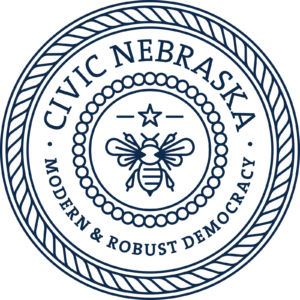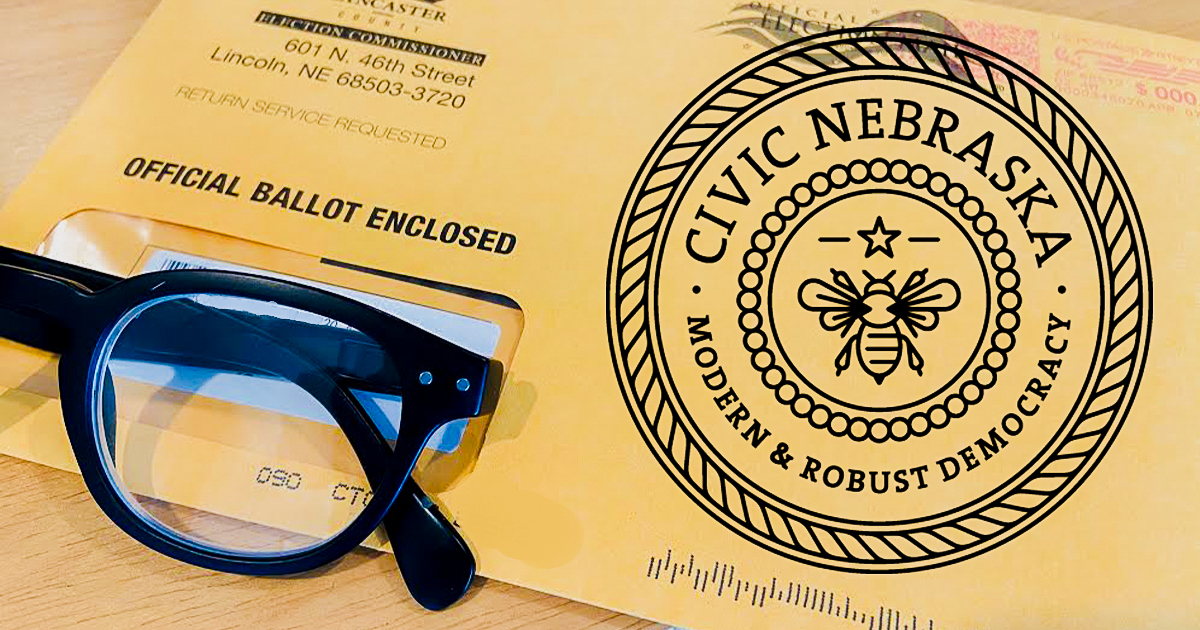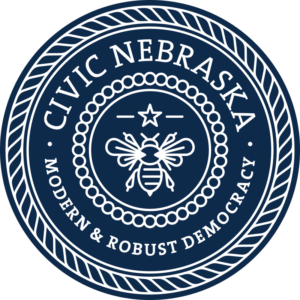In support of LB742
The 1993 National Voter Registration Act created a process by which Nebraskans can register, update, or affirm their registration while having an interaction with the Department of Motor Vehicles. Sen. Vargas’ bill proposes an addition to this provision that will benefit the state in two ways: It will make a current government function more efficient, and it will improve the accuracy, and thus the security, of our voter rolls.
When you’re applying for a new or replacement license at the DMV, the forms provide the option to register to vote while you’re already filling out your paperwork. A lot of people do – about one in five. When they say no, there’s a tremendous opportunity cost for the state.
I say that because updating or affirming a registration while already interacting with a government agency is the most cost-effective and convenient way to keep those rolls accurate. These interactions reduce the need for provisional ballots, reduce confusion on election day, and help our voter rolls easily keep up with voters who move both into and within our state.
All this bill does is change that interaction from an opt-in to an opt-out. There’s ample evidence from other states that this simple change will increase the number of records processed. Moreover, it’s a convenience to voters who would otherwise have to submit a separate application to vote by providing the same information.
The current registration system can be needlessly difficult for many voters such as families, members of the military, and students who move frequently and end up registered in the wrong district, then finding themselves unable to vote or needing to cast a provisional ballot. Automatic voter registration would allow voter registration to automatically move with the voter while moving Nebraska closer to automatic voter registration efforts that have been happening across the country.
I will note that the bill provides for circumstances in which an applicant does not opt out of voter registration but is actually not eligible to vote. We understand that the applicant could be unaware of this status, and so in this case, the registration application will not be considered valid. This would not be considered a violation unless the applicant has willfully and knowingly taken affirmative steps to register to vote knowing that he or she is not eligible to do so. Likewise, if the applicant marks that they are not a citizen, or indicates that they will not yet be 18 years of age before the next election, then the registration request will not be considered valid.
Our four major goals when it comes to elections are high turnout, security, efficiency, and public confidence in the process. This is one of those rare bills that touches on all four components, and it manages to do so without creating any new programs or burdensome regulations. It simply makes a small modification to a process that has been in place for 30 years.
I’ve attached a handout outlining the automatic voter registration practices in other states for your review. In short, Automatic Voter Registration is a fair and impartial way to ensure that every eligible citizen has an opportunity to have their voice heard in our elections. Because it’s also an easy way to improve the accuracy of our voter rolls and reduce government waste, I encourage the committee to advance it to General File.
In support of LB604
As technology evolves, it’s important that our government modernize its processes to keep up. This bill provides several voter conveniences to the process of voting by mail that people have come to expect in their retail interactions. We know that voters appreciate the convenience of voting by mail and the extra time it allows them to thoughtfully research candidates and ballot measures. Voting by mail also provides cost savings to counties that have difficulty finding enough polling places for voters, particularly ones that are ADA compliant, and also struggle to find enough staff to conduct in-person elections.
The increased participation in our elections since voters have the convenience of voting by mail — especially in our rural all-vote-by-mail counties — has been particularly impressive and something we should all want to encourage.
Online ballot request: The Secretary of State’s website has provided the ability for Nebraskans to register to vote online since 2014. Because 40 percent of Nebraska voters are choosing to vote by mail, it makes sense for the Secretary of State’s website to also allow voters to request absentee ballots online. That way a person registering to vote could also indicate their preference to vote by mail. Currently, the application to vote by mail must be mailed or faxed. Nineteen states currently offer this online option.
Permanent list of absentee voters: Four counties — Douglas, Lancaster, Hall, and Buffalo — voluntarily keep permanent lists of voters who have previously voted by mail. These voters receive postcards asking if they’d like to receive an absentee ballot again for each coming election. These voters must return the postcards, providing their own postage. For voters on these lists who have email addresses or phone numbers on file, LB604 would enable elections offices to instead send emails or texts where voters could confirm their wish for an absentee ballot. This would save the election offices postage on printing and mailing postcards. The bill would require all counties to maintain lists of their past absentee voters so all Nebraska voters could enjoy this convenience.
Prepaid postage: In most cases, it is up to the voter to pay for postage to return an absentee/mail ballot envelope to the election official. Postage on absentee ballots is currently paid in nineteen states and Washington, D.C., and we believe Nebraska voters should also have this convenience. While the U.S. Postal Service will typically deliver a ballot envelope even if it does not have sufficient postage, any delay in delivery could sacrifice the voter’s opportunity to vote. Prepaid postage would ensure ballots’ timely delivery.
Ballot receipts: Providing ballot receipts to voters is a simple way for the state to increase confidence in election security and provide peace of mind that our votes were counted. The bill would require that voters who have their phone number or email address on file receive an email or text confirming that the election office received their mailed ballot, the date of its receipt, whether the ballot was accepted or rejected, and if applicable, the reason for its rejection. As Sen. Raybould stated, voters can already look this information up themselves on the Secretary of State’s website, but it seems sensible for this information about voters’ ballots to be provided proactively.

In support of LB365
Nebraska has allowed small counties to designate all-vote-by-mail precincts since 2005. The initial population cap was 7,000. In 2009, the legislature raised the population cap to 10,000. The first county-wide all-vote-by-mail election was in Garden County in May 2018. Under current law, a county may conduct an election entirely by mail under two specific situations: (1) noncandidate special election, ie. a bond issue, (2) candidate elections by precinct in counties with populations fewer than 10,000.
Counties seeking to make a precinct all-mail must submit an application to the Secretary of State to illustrate the need and advantage of switching to an all-mail precinct. Applications are required to discuss the average distance voters travel currently, the condition of the roads, and the accessibility of the polling location including compliance with the ADA. Counties applying also discuss cost-savings that would be realized by switching to all-mail. As part of their application, the county is required to submit a written plan for how the election will be conducted and how the county will notify voters that the election will be conducted by mail.
In a review of all applications submitted to the Secretary of State from 2007 to 2015, the following trends were identified:
›› Distance, lack of ADA compliance, and cost savings included and highlighted in county applications resulted in approval from the Secretary of State;
›› An application that noted opposition from voters, reported polling places that were a reasonable distance from the average voter and suitable for the elderly and handicapped was unlikely to be approved by the Secretary of State;
›› Cost-saving summaries proved to be a crucial factor in obtaining approval from the Secretary of State. Cost-savings evaluations specifically calculated the size of the precincts, ability to get poll workers, amount of money and time that could be saved doing all-vote-by-mail, and rent for the polling locations. Clerks also included the high price of maintaining the AutoMark machines in their county, storage, and maintenance. Clerks reported that the price associated with these duties was not proportionate to the small number of voters that showed up on Election Day.
Eight states currently conduct elections entirely by mail: California, Colorado, Hawaii, Nevada, Oregon, Utah, Vermont (general elections only), and Washington. Only Nebraska and North Dakota allow counties to determine if an election will be held entirely by mail, with many but not all counties choosing to do so.
Voting by mail is actually really safe. A ballot and return envelope are sent to the voter with instructions. The return envelope has an oath that must be completed and signed by the voter. The voter is then responsible for delivering the voted ballot in the completed return envelope either by mail, dropbox, or in person.
After receiving the envelope, the county election official verifies the signature and address of the voter by means of a barcode on the return envelope. The office logs the ballot as received in the state’s Election Management System, and then separates the ballot from the envelope for tabulation.
To maintain the security of the ballot, county election officials take a number of steps: they code the ballot and return envelope, initial the bottom of the ballot, track the status of each ballot through the state’s Election Management System, and they make sure that the signature on the ballot return envelope matches that of the correct voter.
Voting by mail makes it easy to vote and hard to cheat. If someone duplicated a ballot and attempted to vote twice, the Election Management System would accept the first returned ballot but flag an error when the second ballot was received. If someone intercepted another voter’s ballot, they would have to steam it open, fill it out, re-seal it, successfully forge a signature, return it, and all the while hope that the intended recipient doesn’t notice it’s an election year and they never got a ballot.
Vote-by-mail ballots will be clearly addressed to a specific individual, and opening someone else’s ballot is already a felony. County officials and the state take multiple steps to ensure ballots are mailed to the correct addresses. Nebraska currently checks against the National Change of Address files and the Interstate Voter Registration Crosscheck Program. We also check against death records and run a check against the DMV database.
If despite all that a ballot is still mailed to the wrong address, the ballot will be returned to the county (ballots are not forwardable mail). The county can then try to contact the voter over the phone, and send a confirmation card.
Garden County officials noted in 2018 that, while this took some work the first time around, it was definitely worth it. Now, Garden County’s voter roll is “more accurate than it’s ever been,” according to Mindy Santero, Garden County deputy clerk.
Ultimately, using a vote-by-mail standard helps improve the accuracy of the voter registration database. Because a ballot is sent to every registered voter, it will either be delivered without issue or it will be returned to the county election official, who can then take steps to confirm the voter’s registered address.

Follow all 2023 elections and civics bills on our Bill Tracker page.


